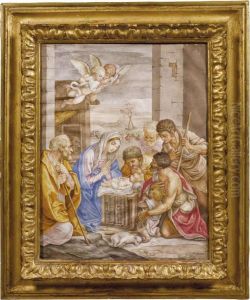Giacomo Antonio Boni Paintings
Giacomo Antonio Boni was an Italian archaeologist, architect, and visionary, born on April 25, 1859, in Venice, Italy. He is renowned for his innovative archaeological techniques and his work at the Roman Forum, where he served as the director of excavations from 1898 until his death in 1925. Boni's approach to archaeology was groundbreaking for his time; he emphasized the importance of stratigraphic excavation, which involves digging and recording layers of earth to understand the chronological sequence of human activity. This method was a departure from the treasure-hunting approach that characterized much of archaeology during his era.
Boni’s education and early career were rooted in architecture, having studied at the Accademia di Belle Arti in Venice. His architectural background profoundly influenced his archaeological work, particularly in the preservation and restoration of ancient structures. Before his work in the Roman Forum, Boni was involved in restoration projects across Italy, including his work on the Medieval fortifications of the city of Padua.
In 1898, Boni was appointed to oversee the excavations of the Roman Forum, a role through which he made his most significant contributions to archaeology. He introduced several innovative practices, including the use of plaster casts to preserve the imprint of organic materials, such as wooden structures, that had decayed over centuries. Moreover, he was one of the first to apply photographic documentation in archaeology, ensuring a detailed record of finds and excavation sites. Among his notable discoveries were the Lapis Niger, an ancient black stone shrine believed to be the final resting place of the Roman King Romulus, and the Regia, the official residence of the kings of Rome.
Boni was also deeply interested in the topography of ancient Rome and the religious practices of its inhabitants. His excavations often focused on uncovering the spiritual and communal aspects of Roman life, rather than solely its imperial and monumental architecture. He was a pioneer in acknowledging the importance of everyday objects in understanding ancient cultures, including tools, pottery, and personal items.
Giacomo Antonio Boni's work left a lasting legacy in the field of archaeology, influencing future generations of archaeologists in Italy and beyond. His methods and insights helped transform archaeology into a more scientific and disciplined field. Boni passed away on August 10, 1925, in Rome, leaving behind a wealth of knowledge and an enduring impact on the study of ancient civilizations.




